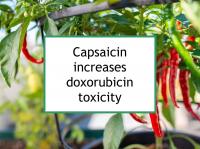Capsaicin, the compound that gives hot chili peppers their heat, has been found to inhibit triple negative (ER-/PR-/HER2-) breast cancer cell growth and increase cell death without harming normal cells. Capsaicin has also been shown to overcome multidrug resistance to doxorubicin. Now a new study has reported that capsaicin increases the treatment effects of doxorubicin in a mouse model of triple negative breast cancer.
Capsaicin should be consumed in moderation as part of food
The best sources of capsaicin are hot peppers. Examples include cayenne peppers, hot chili peppers, jalapeño peppers, and Sichuan peppers. Hot sauce, sriracha sauce, chili powder, red pepper flakes and red pepper paste are also sources of capsaicin. Bell peppers and other mild or sweet peppers, as well as paprika, incorporate little capsaicin.
Most hot peppers are good dietary sources beta-carotene, lycopene (red varieties), quercetin and luteolin, all of which have also been found to have chemopreventive effects. Evidence suggests that these compounds can act synergistically with capsaicin to prevent breast cancer.
Capsaicin should not be taken as a supplement. Frequent consumption of hot peppers has been found to be associated with esophageal, gall bladder and gastric (stomach and intestinal) cancers. In countries such as Mexico with relatively high hot pepper consumption, low intake has been shown to protect against stomach cancer whereas high intake increases the risk. While most U.S. residents are not likely to consume extremely high levels of capsaicin in food, taking cayenne pepper or similar supplements could put them at risk.
Latest research finds capsaicin potentiates doxorubicin
The study referenced above was designed to investigate the treatment effects of capsaicin in a mouse model of triple negative breast cancer. When stage IV triple negative disease occurs within a few years of initial treatment, it suggests that cells with metastatic properties escaped chemotherapy. TGFβ (transforming growth factor beta) signaling has been reported to play an important role in triple negative breast cancer's aggressiveness. In fact, TGFβ inhibitors are currently under investigation as antimetastatic agents. Cell studies suggest that capsaicin has the potential to act as a TGFβ inhibitor, however animal studies have not been undertaken until now.
To conduct the study, the authors used a 4T1 transplanted triple negative breast cancer mouse model. Tumor growth, metastasis and survival were assessed at 14, 28 and 42 days after the mice were inoculated with triple negative tumor cells. The combination of capsaicin plus doxorubicin was found to be more effective in reducing primary tumor burden and metastasis, as well as improving survival, compared to treatment with capsaicin or doxorubicin alone. Capsaicin caused TGFβ inhibition both at primary tumors and metastatic sites. The authors comment that the results demonstrate the potential of combining capsaicin with conventional chemotherapeutics in triple negative breast cancer treatment.
Please see our articles on Foods to eat and avoid during doxorubicin chemotherapy and Foods to eat & avoid for triple negative breast cancer and the capsaicin tag for more information.
